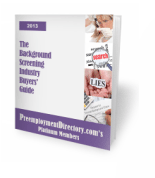| |
| BACKGROUND
SCREENING NEWS |
Rockefeller
Seeks Detailed Information From Data Brokers
The chairman
of the powerful Senate Commerce Committee has sent letters to
Reed-Elsevier (Lexis-Nexis), Spokeo, Experian and a half dozen
other data brokers seeking detailed info on how they compile
and sell consumer information.
"Collecting, storing and selling information about Americans
raises all types of questions that require careful scrutiny,"
said Rockefeller. "While these practices may offer some benefits
to consumers, they deserve to know what's being collected about
them and how companies profit from their information," Rockefeller
said in a statement Wednesday.
To read the full article
click here and to see a copy of the letter click
here

Three
years of the Baker's Dozen Rankings
Compare
the listings of the top ranked background screening firms according
to HRO Today.
Employment
Screening 2011
1. Universal Background Screening
2.FirstPoint Background Screening Resources
3.SecurTest
4.TalentWise
5.EmployeeScreenIQ
6. General Information Services
7. Global HR Research (GHRR)
8. Employment Background Investigations
9.Corporate Screening Services
10.Orange Tree Screening
11. HR Plus
12. Verifications
13.Sterling Infosystems
To see all three years rankings go to http://www.hrotoday.com/content/5225/triple-threat

The
Catch-22 of Criminal-Background-Check Guidance
Though
employers have had a few months now to become familiar with
the U.S. Equal Employment Occupation Commission's guidance on
the use of criminal background checks, questions and confusion
about how best to respond have only grown.
The guidance,
issued April 25, is broad in its scope and specificity, essentially
recommending that employers now only ask to see criminal records
when such inquiries can be proven to be job-related. What this
has created -- especially in this presidential election year,
when a November Republican victory could change the tone and
direction of many directives coming out of Washington -- "is
a very tough Catch-22," says Gerald L. Maatman Jr., partner
at Chicago-based employment law firm Seyfarth Shaw.
"You either
hire someone who could hurt your workforce, or you get in trouble
for not complying with the EEOC mandate and EEOC enforcement."
"I think the jury's out on just how possible this [revamping
of all hiring practices and training] really is," he says. "A
lot of my clients are saying, 'I could comply if I had buckets
of money to spend to administer this.' "
In some
cases, employers are simply refusing to follow the guideline
for fear it will either put them out of business -- considering
this new cost of training -- or create an unsafe working environment,
says William Tate, president of Chicago-based HR Plus, a screening-solutions
provider.
To read
more click
here

Half
of All Employers Have Hired Workers With a Record
While having
a run-in with the law can have long-term repercussions for job
hunting, a new study from CareerBuilder shows organizations
are open to giving people second chances. Fifty-one percent
of Human Resource managers reported that their organizations
have hired someone with a criminal record. The survey was conducted
online within the U.S. by Harris Interactive©
on behalf of CareerBuilder among 2,298 U.S. hiring managers
and human resource.
"The number
one recommendation hiring managers have is to own your past
and focus on what you learned from it to grow professionally
and personally," said Rosemary Haefner, Vice President of Human
Resources at CareerBuilder. "You also want to stay active. Taking
classes, volunteering and tapping into social networks can be
good ways to help overcome obstacles associated with job hunting
with a criminal past."
To read
more click
here

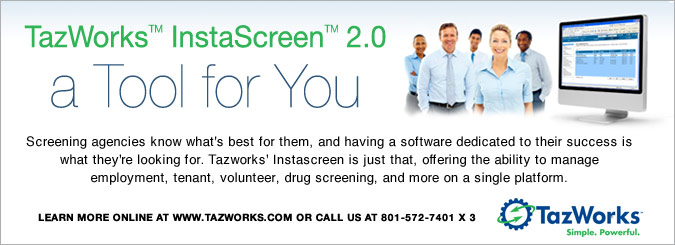

| BACKGROUND
SCREENING NEWS continued |
Background
Checks Too Expensive for All Contractors, Bloomberg Says
Background checks that would prevent ex-cons from
getting lucrative city sub-contracts are too expensive, said
New York City Mayor Michael Bloomberg. Currently, the city doesn't
require agencies to conduct background checks when they're awarding
sub-contracts for less than $100,000. That
means ex-cons like Nicholas Analitis, who served three years
in prison for passing bad checks and ripping off banks, was
able to land hundreds of thousands of dollars worth of contracts,
despite his history. Analitis is now accused
of swindling his workers out of tens of thousands of dollars
by paying them with phony checks. But Bloomberg
said that requiring background checks on every person looking
to do business with the city wouldn't be worth the cost. Analitis
found a loophole in the Vendex questionnaire provided by the
Mayor's Office of Contract Services, which is required when
applying for work in the city. Since the contracts were less
than $100,000, Analitis was approved without a background check.
Ironically, the Vendex system was created to weed out businesses
linked to criminals or organized crime and prevent them from
getting taxpayer-funded projects.
To read more, click here

Hiring Ex-Offenders: Time For a Different Approach
Obtaining and maintaining employment is one of three
dominant factors (along with marriage and military service)
in explaining desistance - why and how people stop committing
crimes. The search for effective recidivism reduction strategies
has increased, despite their lack of success. In many cases,
recidivism was not reduced, and in some instances it increased.
Recognizing the criminal mindset or "criminal thinking" is important,
for it must be addressed and changed if the offender is to have
a decent shot at obtaining and keeping a good job. Job retention
is often a bigger challenge than the securing of a job. This
mindset is generally not supportive of legitimate employment
and the behaviors required to sustain it over the long term.
The risk that we run when taking the approach of jobs
first is that we will send offenders to work without the preparation
and skills they need to cope with the contemporary workplace.
In addition to vocational counseling and job preparation services,
we need to expend the resources and take the time to ensure
that the offender we send out to work is as ready as possible
and has the right mindset to succeed in the workplace.
To read more, click
here

Conduct Thorough Background Checks on Travel Agents
People have been urged to conduct thorough background
checks on travel agents. Consumer Council of Fiji has received
91 complaints against travel agents in the last three and a
half years and 13 complaints up until September this year. Chief
Executive Officer Premila Kumar said that there are bogus travel
agents who demand lump sum of money after promising consumers
work permits, migration visas and permanent residency in overseas
countries. Kumar said it has been brought to the Council's attention
that some of these travel agents close overnight and people
have no idea what to do. The Council is concerned that such
cases will continue to rise, as there is no proper monitoring
system in place and no monitoring authority to look into this
problem. The Council has resolved some cases through mediation
held at the Council where the travel agents agree to refund
partially or the full amount, however most of the cases however
have been referred to CID for investigations.
To read
more, click
here

RSA 2012: U.S. Lobbying Hard to Alter EU Data Protection Law
The American government wants European data protection proposals
changed, and is working with the U.S. Chamber of Commerce to
lobby the EU to alter them. The European Commission proposed
a fresh directive and a new regulation on data protection last
year that came under fire for introducing a number of "overbearing"
proposals, including fines of up to two percent of the global
annual turnover of a company for severe security events, a 24-hour
data breach disclosure rule, a stipulation to make companies
with more than 250 employees appoint a data protection officer,
and the need to implement "privacy by design". Adam Schlosser,
the U.S. Chamber of Commerce's senior manager for global regulatory
cooperation said the Chamber of Commerce had made incremental
progress, and that the business community will need sustained
and continued efforts to develop a pragmatic approach that considers
how a final regulation can actually work in the real world.
Schlosser noted that some of the biggest concerns are providing
flexibility for different business models, allowing for compliance
with existing legal obligations (such as anti-fraud) both in
the EU and in third countries, and creating a 'one-stop shop'
that is predictable and consistent.
To read more, click
here

10 Ways Electronically Stored Information is Changing
the Investigative Industry
Discovering
the answers needed for an effective background checks client
requires delivering on your promise to gather intelligence on
the subject you are investigating. Increasingly the investigative
industry is more interested in Electronically Stored Information
(ESI) than many of the old methods of collecting data.. Whether
the information comes from private data sources (e.g. CLEAR,
TLO, and IRB), from public records, or from electronic evidence
(e.g. email records and internet log files), the availability
of large volumes of intelligence in an electronic format is
appealing. Modern investigators seize the opportunity to access
this information with apparent simplicity, efficiency and convenience
while leveraging the intel into more valuable case results.
Here are 10 ways that electronically stored information is changing
the investigative industry today:
To read
more click here

Privacy
and Civil Liberties Oversight Board To Hold First Public Meeting
The Privacy
and Civil Liberties Oversight Board will hold its first public
meeting this month, according to a notice in the Federal
Register. The board, which aims to provide privacy
oversight on U.S. surveillance and security measures in the
fight against terrorism, had remained dormant since 2007, inciting
widespread criticism. President Barack Obama appointed new
members to the board in 2011, and the Senate confirmed four
of five nominees earlier this year. The aim of next Tuesday's
meeting is to gather feedback from nongovernmental organizations
and members of the public on priorities the board should consider
on its forthcoming agenda. The public portion of the meeting
will take place from 10 a.m. to noon on October 30 in Washington,
DC.
Source:
www.Privacyassociation.org
To read
more click
here

| Welcome
to the U.S. Legal Challenge Question! |
Sponsored By:


As the background
screening industry continues to get more competitive the firms
that will ultimately succeed will be those that create competitive
advantage through their people by offering continuous learning
opportunities to heightened their knowledge and capabilities.
We believe that having employees that are very knowledgeable about
the legal landscape of background screening is essential to continued
success.
We are grateful
to Ann Cun, Counsel and Principal Editor at LawLogix,
Inc for providing the expertise for this valuable endeavor.
For information regarding the answers to the Legal Challenge Questions,
please contact Ann Cun, Counsel and Principal Editor, LawLogix
Group, Inc. at (602) 357-4240 and for more information about LawLogix
e-verify and immigration support services please visit www.Lawlogix.com
Please choose
your answer by clicking on it:
New
Requirements for NJ Employers and for Employers Conducting Business
in Newark, NJ
The State
of New Jersey has introduced a new requirement for employers with
50 or more employees in New Jersey to post and distribute to employees
a notice that State and federal law provides for gender pay equity
and prohibits wage discrimination based on gender. The law goes
into effect in November. Effective November 18, 2012, the City
of Newark will impose restrictions on employers conducting hiring
in the City with regard to the use of criminal background checks
for job applicants. Employers are prohibited from (1) conducting
pre-application criminal background checks and inquiries and (2)
denying employment based on the results of a criminal background
check conducted post-offer unless the employer first conducted
an individualized analysis of the criminal background using factors
listed in the new Ordinance. An employer may discuss an applicant's
criminal background pre-offer if the applicant discloses his/her
criminal history voluntarily and without solicitation. Penalties
will range between $500 and $1000 per violation.
To read more, click here

May Employers Require Job Applicants To Provide Home Addresses?
Some employment applications require job applicants
to provide a physical home address, and state that a P.O. Box
will not be accepted. This may be (or soon become) illegal under
the latest development in employment law: laws prohibiting discrimination
against the homeless. Earlier this year, Rhode
Island passed into law the first "Homeless Bill of Rights" which
makes it unlawful to discriminate against an employee or applicant
"due to his or her lack of a permanent mailing address, or his
or her mailing address being that of a shelter or social service
provider." In other words, an applicant cannot be refused employment
simply because he or she does not provide an actual home address.
Homeless advocates are pushing for similar legislation in other
states. For instance, a California town recently passed a resolution
urging the state legislature to enact a law that incorporates
Rhode Island's protections, but goes a step further by expressly
prohibiting discrimination against an applicant or employee for
providing a P.O. Box as his or her address.
To read more,
click
here


Invest
a Few Minutes Screening Now, and Save Thousands of Dollars and
Extra Work Later
Not all tenant screening companies were created equally,
and as such, it is important to research the companies that provide
you with the information that directly affects your investment
and community. A good place to start is with
the company that actually supplies the reports; not necessarily
the tenant screening company (as in most cases they are authorized
resellers of the data). It is important to know the name of the
company, how long they have been in business, and if they offer
criminal checks on a national level. Getting a national background
check for a few dollars more could save you thousands in damages
or court fees later on. And keep in mind - if you are charging
applicants an application or screening fee, the money won't be
coming from your budget. Make sure you spend at least 7-10 minutes
to input an application into the system because you want to have
as much information as possible. Don't just screen your residents
- make sure you understand what you are getting in your reports,
and exactly where they are coming from.
To read more,
click here

New Jersey Township Petitions U.S. Supreme Court to Decide Whether
Disparate Impact Claims are Available Under the Fair Housing Act
(FHA)
The Township
of Mount Holly, New Jersey has filed a petition for certiorari
in the U.S. Supreme Court raising the issue of whether disparate
impact claims are available under the Fair Housing Act (FHA).
The issues raised in the Mount Holly petition are virtually a
carbon-copy of those in Magner v. Gallagher, the case that would
have decided the disparate impact issue but for the City of Saint
Paul's last-minute decision to dismiss its appeal. The Consumer
Financial
Protection Bureau (CFPB), joined by HUD and the Department of
Justice, has insisted that disparate impact claims are viable
under the FHA and ECOA. If the Court agrees to hear the Mount
Holly case, these agencies will have the opportunity to test their
interpretations of these statutes against the plain text of the
statutes themselves. It is predicted that the Supreme Court will
find an absence of any plain-language support for disparate impact
claims, and will not defer to the government's views on this issue.
This case will present yet another opportunity for HUD's proposed
disparate impact rule under the Fair Housing Act to interact with
the Court's decision on granting certiorari.
To read more, click
here

Beige
Book: Economy Continues to Grow Modestly
The economy grew modestly in late August and early September,
with activity picking up in 10 of 12 districts, the Federal Reserve
said in a report. The Fed's beige book, named for the color of
its cover, was slightly more tempered than the report on the previous
six-week period, which showed modest or moderate growth in nine
of 12 Federal Reserve bank districts. Uncertainty about looming
tax increases and spending cuts, the presidential election and
the European financial crisis all restrained hiring. At the same
time, employers in several areas said they were having trouble
finding skilled employees. Consumer spending was up only slightly,
manufacturing was mixed and the job market was little changed.
On the bright side, the housing market showed widespread improvement
with all 12 districts reporting stronger existing home sales,
in some cases substantially. The commercial real estate market
- typically a barometer of the job market - softened in the Northeast
and picked up some in Atlanta, Minneapolis and San Francisco.
Rising gasoline prices, weather and "political uncertainty" damped
sales, and Atlanta and San Francisco reported that discounters
are doing better than department stores. The European financial
crisis and recession have hurt U.S. exports, particularly manufacturers.
To read more,
click
here

SHRM
Leading Indicators of National Employment® (LINE®)
| EMPLOYMENT
EXPECTATIONS |
Manufacturing
|
Service
|
|
In October, the hiring rate will rise in both
sectors compared with a year ago. |
+4.2
 |
+4.9
 |
|
http://www.shrm.org/Research/MonthlyEmploymentIndices/line/Pages/default.aspx

Forrester:
Most Data Breaches Caused by Employees
Most data breaches are caused by mundane events such
as employees losing, having stolen or simply unwittingly misusing
corporate assets, a Forrester Research report has found.
After questioning over 7,000 IT executives and ordinary
employees across North America and Europe, 31% cited simple loss
or theft as the explanation for data breaches they had experienced,
ahead of inadvertent misuse by an employee (27%). Additionally,
external attacks accounted for 25% of cases, and abuse by malicious
insiders only 12%. Predictably, the arrival of mobile devices
and the consumerization of IT hasn't helped matters. Most organizations
formulate policies for securing mobile devices but, paradoxically,
lack enough tools to enforce them. Thirty-nine percent worried
about a lack of data leak prevention on mobile devices, with half
concerned about the consequences of old-fashioned theft. The most
common form of mobile device security is password entry plus remote
lock and wipe with almost a quarter admitting they haven't started
using any form of data protection at all.
To read more,
click here

Internal Fraud on the Rise
The level of corporate fraud committed by insiders has
increased for the second year in a row, according to figures from
the Kroll Advisory Solutions Global Fraud Report. The report revealed
that company employees committed 67% of corporate frauds in 2011,
up from 54% a year earlier. Less than two-thirds
(63%) of European companies were knowingly affected by fraud in
2011, while 56% said their exposure had increased over that time.
Interestingly, the report highlighted data theft as
one of the most prominent categories of fraud for European companies
after 18% fell victim to it in the past year. Expansion
into new and emerging markets was listed as one of the main causes
of increased exposure to fraud. Other key global findings include:
concern about fraud is dropping faster than fraud itself and developed
markets reported significant levels of fraud.
"Increasingly,
fraud exhibits industry-specific and regional characteristics,
which require detailed knowledge of a market, sector, business
process or culture to unearth, redress and prevent," said Kroll
Advisory Solutions chairman, Tommy Helsby. "Companies that get
complacent about it do so at their own peril."
To read more, click
here

Fraud Prevention in a Bad Economy
Recently the Kansas City Business Journal reported on an intriguing
study about the importance of corporate image. In light of heightened
concern about ethical standards and conduct in the business and
professional world, Fleishman Hillard, a public relations firm,
and the World Economic Forum, surveyed 132 delegates about corporate
reputation. Seventy-seven percent of the business leaders responded
corporate reputation - its need to maintain a strong, positive
image - has become more important recently. This increased focus
on reputation has stimulated a renewed interest in integrity.
Whether we realize it or not, we all have a code of ethics we
live by; unfortunately, many have no strong moral foundation.
Any risk assessment and advice on loss prevention should cover
the following aspects and each area should be unpacked to understand
the actual risk the organization faces, the strengths or weaknesses
in the existing system and then recommendations on how to manage
risk going forward: physical security; people security - including
employees and third-party employees; the security of systems and
procedures; technology; and the management of security.
To read more,
click here

LawLogix
Wins IT Department of the Year at the American Business Awards


Team
EBI Joins Maryland Supporters for this Year's Race for the Cure
On Sunday,
October 21, 2012, the staff of Employment Background Investigations,
Inc (EBI) joined thousands of other racers to support the Komen
Maryland Race for the Cure®. This year marks the sixth consecutive
year EBI has supported this great cause as a commitment to our
family, friends and co-workers that are inflicted with breast
cancer. Our encouragement and dedication is again driven from
our co-worker and teammate, Heather Garner who lost her life to
breast cancer just over a year ago in August of 2011. Her fond
memory is still with us as she continues to be the driving spirit
alongside our team.
To read more
click here

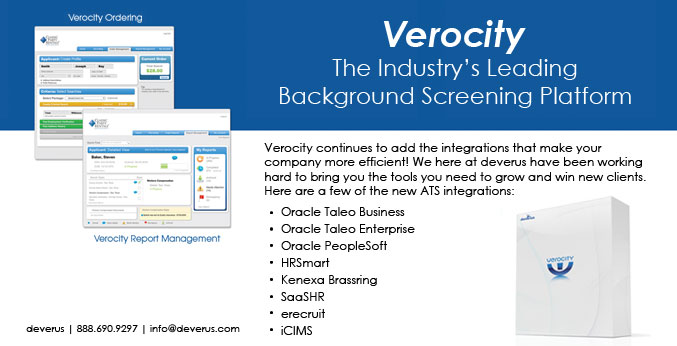

Results
from the 2011 National Survey on Drug Use and Health: Summary
of National Findings
This report
presents a first look at results from the 2011 National Survey
on Drug Use and Health (NSDUH), an annual survey of the civilian,
noninstitutionalized population of the United States aged 12 years
old or older. The report and detailed tables present national
estimates of rates of use, numbers of users, and other measures
related to illicit drugs, alcohol, and tobacco products. The report
and detailed tables focus on trends between 2010 and 2011 and
from 2002 to 2011, as well as differences across population subgroups
in 2011. NSDUH estimates related to mental health, which were
included in national findings reports prior to 2009, are not included
in this 2011 report but will be available by late 2012 in another
report and set of detailed tables. Also included below is a link
to a set of tables assessing the effects on estimates from using
2010 census-based control totals in the 2011 NSDUH weighting process
since NSDUH estimates for 2002 to 2010 were based on weights developed
using 2000 census-based control totals.
To read more
click
here

Point-of-Collection
Option Grows
Technologies for an on-site drug testing option that has proven
extremely convenient in criminal justice settings continue to
become more readily available to addiction treatment programs,
though many treatment centers still wrestle with whether it makes
sense for them to devote the in-house time needed to process their
own testing of clients and analysis of test results. Bill Current,
president of WFC & Associates, who oversees the Ultimate Guide
to State Drug Testing Laws subscription service, says there are
currently 50 million tests a year being conducted and only 10%
use point-of-collection devices. While three states prohibit these
devices, most others states have restrictions in place, such as
those statutes that allow point-of-collection testing only for
pre-employment screening purposes.
"When most state drug testing laws were written, 10
years ago or more, they were geared specifically for the workplace
market," said Current. "Therefore, the answer to the question
of whether any state restrictions on point-of-collection testing
apply to addiction treatment organizations must be researched
on a state-by-state basis, with a close examination of statute
language."
To read more,
click here

$750,000 EEOC Settlement Highlights Pitfalls of Drug Testing for
Prescription Medications by Employers
An auto parts manufacturer has entered into a consent
decree with the Equal Employment Opportunity Commission (EEOC)
requiring it to pay $750,000 to a group of current and former
employees at its Lawrenceburg, Tennessee facility based on allegations
that company drug testing practices violated the Americans with
Disabilities Act (ADA). The EEOC alleged that
the company tested all of its employees for 12 substances, including
certain legally prescribed drugs, in violation of the ADA. It
also alleged that the company required those employees who tested
positive for legally prescribed medications to disclose the medical
conditions for which they were taking the medications and to cease
taking them. The company then suspended employees until they stopped
taking their prescription medications and fired those who were
unable to perform their job duties without the benefit of the
medications. Employers must ensure that testing for prescription
medications is job-related and consistent with business necessity.
Also, employers should not have blanket rules prohibiting employees
from using certain prescription medications without undertaking
an individualized assessment of the particular employee's situation.
To read more,
click
here

Substance
Abuse: Workplace Safety
The U.S. Department of Labor's Occupational Safety and Health
Administration (OSHA) reports that substance abuse by workers
is a problem at U.S. workplaces. According to OSHA, 12.9 million
of the 17.2 million illegal drug users age 18 or older were employed
either full or part time in 2005. In addition, the agency says
between 10 and 20% of workers who die on the job tested positive
for alcohol or other drugs. Drug use by employees can have financial
ramifications as well. The Office of National Drug Control Policy
at the White House states that the economic cost of drug abuse
in the U.S. was estimated at $193 billion in 2007, including $120
billion in lost productivity. Drug use by employees also resulted
in $11 billion in healthcare costs in 2007. Some of these costs
may be a result of workers with substance abuse problems who move
from one job to another in a relatively short period of time,
and full time workers with a drug or alcohol problem who are more
prone to miss work due to illness or injury. OSHA says that businesses
can help address the avoidable problem of employee drug abuse
by implementing drug-free workplace programs aimed at helping
workers maintain their safety and health.
To read more,
click here

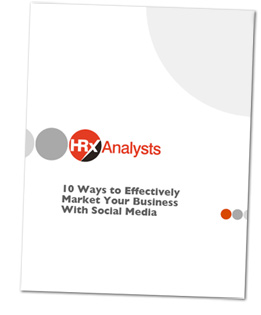 |

Social
Media Overload
You see it. In fact, you can’t avoid it. Like the
rest of us, you are being bombarded with social media. You
understand the game is changing. But there is so much information,
where do you even start? Or if you have started, are you
investing your efforts in the best places and the most effective
ways? Download this new whitepaper, 10
Ways to Effectively Market Your Business With Social Media,
from HR influencer and marketing expert John Sumser of HRxAnalysts.
You’ll learn10 simple ways to harness social media
to get more visibility for your product and grow your company.
|

STOP
STRUGGLING WITH WRITING AND PUBLISHING YOUR NEWSLETTER: |

We can help
you have a high quality e-newsletter to help nurture your relationship
with your clients and attract new clients. Our customized newsletter
service will take over your newsletter task or create a new one
for you. We can manage the creation of your newsletter for you.
We are constantly
researching information to use for The Background Buzz and
you can put our research to use for you. Using the information
rich content from The Background Buzz (minus the ads
and competitors information) we will create a custom newsletter
for you.
Use your staff’s
time to do more valuable work and save all the hassle of researching
or writing articles, formatting and managing all the other ezine
tasks with our customized ezine process.
Contact Barry
Nixon at 949-770-5264 or at wbnixon@aol.com
for more information.

Google Plus Basics for Your Investigations Firm
Many private investigators are already aware of the advantages
of being a member of the many social networks on the web. They
serve as important tools for marketing, education, networking
with colleagues and clients, skip tracing, people locates, and
more. Facebook, LinkedIn, Twitter, and Yahoo already have active
communities of private investigators, but Google's social network,
Google Plus, hosts some unique features and benefits that make
it an important network for every private investigator to join.
Google Plus is different than other social media sites in its
unique features like Hangouts and Circles as well as in benefits
like personal branding and local search optimization. A clean
and easy-to-use interface makes navigating profiles and posting
information easy, and with an educated and tech-savvy user base,
Google Plus is already gaining popularity within the industry.
For private investigators, having circles means that you can discuss
software and industry issues with colleagues without your clients
seeing, and conversely offer deals to your clients that your competitors
won't see. Additionally, if you want to share photos of your vacation
with family and friends, you can do so without those posts overlapping
into your professional life.
to read more click
here

| BACKGROUND
SCREENING NEWS (continued) |
Background Screening & Hiring Costs
Employers
conduct checks of job applicants' background to mitigate risk,
reduce liability, improve the quality of new hires, promote workplace
safety, and meet regulatory compliance requirements. The process
has been simplified in recent years by the rapid growth in the
professional background screening industry-and most companies
take advantage of these firms' services, according to respondents.
Only 21 percent of companies rely exclusively on in-house staff
to conduct security background checks on new hires, and those
that do tend to be smaller employers. In addition to ease of use,
cost is another motivation to utilize outside firms to conduct
background checks. The median cost for conducting a security background
check is 25 percent less when utilizing an outside agency than
exclusive use of in-house staff, according to respondents. Interestingly,
companies that leverage the different strengths of both in-house
staff and contract firms in their background check process report
paying the least-just $62.50 per new hire.
The lure
of using an outside firm to conduct background checks can't blind
organizations to their limitations, however. These firms may inflate
the extent of their databases, and security teams need to assess
what they cover and how frequently the provider updates them.
Tests of online screening firms have shown that applicants with
criminal histories can slip through, and companies should conduct
their own tests-by periodically sending in a name for which a
criminal history is known-to see whether the provider accurately
identifies it.
To read more
click
here

BRB
Update
Sponsored by:
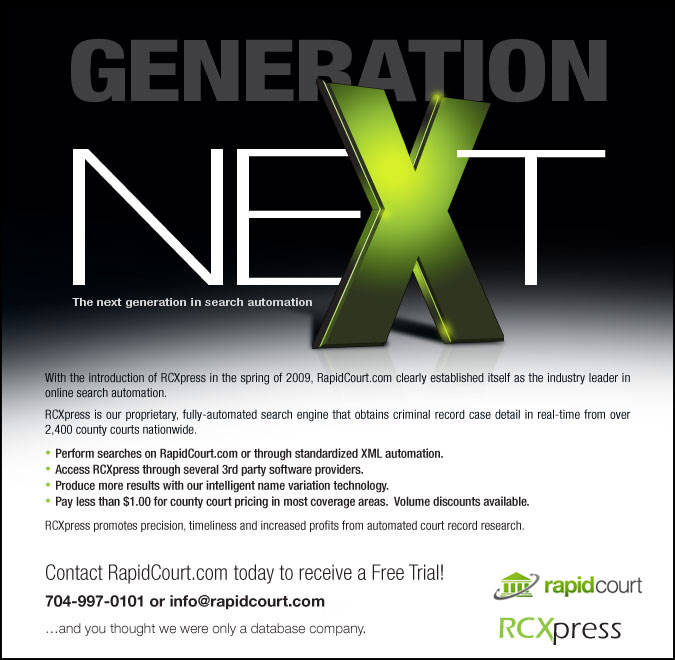
BRB
Update
By Mike Sankey, PRRN
| Important
to Illinois Public Record Searchers |
The Illinois
Department of Professional Regulation recently issued a "cease
and desist" letter to a PRRN (Public Record Retriever Network
- www.prrn.us ) member
based in Illinois for performing public record research and not
having a private investigator's license. The Department interpreted
that the act of researching public records is considered to be
performing an "investigation." This is regardless if the PRRN
Member was merely researching and reporting to a attorney, private
investigator, or consumer reporting agency (CRA) what is found
in a court's public record docket.
The licensing of Private Investigators is governed by 225 ILCS
§447. Article 5 defines, in part, that a private investigator
is someone who "...engages in the business of, accepts employment
to furnish, or agrees to make or makes investigations for a fee
or other consideration..." Articles 10 and 15 list exemptions.
See the statute at www.ilga.gov/legislation/ilcs/ilcs2.asp?ChapterID=24
At present
the only state in the U.S. that requires a pure public record
researcher to have a PI license is Nevada. Of course, if a researcher
or document retriever is openly advertising the he/she provides
background investigations or provides criminal background checks,
then in some states (including IL) a PI license may very well
be required. Also it should be noted that some states, such as
Nebraska, require title abstractors to be licensed as an abstractor.
Interestingly,
similar situations occured several years ago in Arizona and Texas.
The states had similar laws to IL. A PRRN members was actually
thrown in jail in Texas. But the issues were resolved and the
end result is that public record researchers are not required
to be licensed as PIs when simply hired by private investigators
or Consumer Reporting Agencies (CRA) to report facts in the public
records.
If this issue
is of interest, there is an older, but still applicable article
titled "The Trouble With PI Licensing Statutes" written by Carl
Ernst, found on the BRB Publications site at www.brbpublications.com/articles.aspx
.
Source: http://www.brbpublications.com/update.aspx?id=264
Printed with permission of BRB Publications
|
BRB's FREE RESOURCE CENTER |
For
the MOST COMPREHENSIVE RESOURCE describing all access methods,
restrictions, fees, and search procedures on over 26,000
government and private agencies visit the
Public Record Research System (PRRS-Web) . We provide
the extensive details and in-depth data you will not find
doing a Google search!
For more information contact Michael Sankey at mike@brbpublications.com
or visit www.brbpublications.com/updates.aspx

One
Site! Many Suppliers! |

Looking
for the Top Suppliers in the Industry? Need to find a
new Supplier?
Visit our VENDOR
SHOWCASE which features suppliers to the
Background Screening Industry.
2012
Fall Edition of Suppliers to the Background Screening
industry Guide
Now Available!
Click
here or on image to get a copy

Contact
Barry Nixon at wbnixon@aol.com
for information on getting your firm listed in the Summer
Edition.

ICE
Releases Guidance on Evaluating Electronic I-9 Systems
The U.S. Immigration and Customs Enforcement
(ICE) has released the first-ever official guidance document
for evaluating electronically generated and stored I-9
records during an audit. The document provides guidance
to Homeland Security Investigations (HSI) special agents
and auditors on what information they should collect from
employers using electronic I-9 systems as well the minimum
electronic audit trail requirements for use in determining
I-9 related fines. The regulations require that whenever
an electronic I-9 is created, completed, updated, modified,
altered or corrected, an electronic I-9 system must create
a secure and permanent record that establishes the date
accessed, who accessed it, and what action was taken.
Employers storing electronic I-9s are also required to
maintain an "indexing system" and to "reproduce legible
and readable hardcopies" of the electronically completed
and retained I-9 forms. Employers are well advised to
partner with a vendor that takes the most conservative
approach to audit trails (and the regulations) in designing
their software.
To read more,
click here

Recent Study Reveals E-Verify Shortcomings
The
CATO institute released a highly critical report on the
actual impact E-verify has on employers in Arizona. The
2007 Legal Arizona Workers Act (LAWA) required statewide
businesses to enroll and use the E-Verify system by January
of 2008. Arizona industries, including construction, agriculture
and real estate, have suffered significantly not only
as a result of the economy, but also from the effects
of LAWA. While LAWA decreased the unauthorized resident
population by 36% between 2008 and 2010, it also suppressed
housing sale prices and raised the cost of conducting
business, preventing employers from expanding or hiring
more workers. In addition, the E-Verify system produces
a 4.1% inaccuracy rate for workers, 3.3% of those initially
found to be unauthorized actually are authorized to work,
and it fails to identify 54% of unauthorized workers,
due primarily to employment-based identity-fraud. It is
evident that improving the accuracy rate of E-Verify is
an essential step towards widespread adoption by businesses.
Favorable adoption by businesses of the E-Verify will
increase only when the cost of adoption by employers is
outweighed by the benefits.
To read more, click
here



Employers
Not Immune from Punishment by OSC for E-Verify Violations
The Justice Department has entered into a settlement
agreement with Diversified Maintenance Systems, LLC, a
provider of janitorial and facilities maintenance services
based in Tampa, Florida. This is one of the first publicized
cases where OSC investigates discrimination based on an
employer's conduct related to the use of E-Verify. The
employer told the employee in question about her tentative
non-confirmation that was generated as a result of data
mismatch. The employee was unable to correct her data
because she was lacking the proper E-verify paperwork
and the E-Verify system ultimately produced an erroneous
final non-confirmation. After being fired, the employee
called the E-verify hotline, where the OSC informed her
she was authorized to work. However, the employer refused
to reinstate her. The employee subsequently filed a complaint
with the OSC on account that she had
asserted her right to work under the INA provisions for
anti-discrimination and that the employer had retaliated
against her when she exercised this legal right. Before
any further legal action was taken the employer agreed
to settle the case with the Justice Department, which
resulted in fines and additional training requirements.
To read more, click
here

USCIS Launches Spanish-language I-9 Central on USCIS.gov
U.S. Citizenship and Immigration Services (USCIS) has
launched a Spanish-language version of I-9 Central, an
online resource center designed to provide information
and assistance related to the most frequently accessed
form on USCIS.gov: Form I-9, Employee Eligibility Verification.
This free, easy-to-use website provides employers and
employees simple one-click access to resources, tips and
guidance to properly complete Form I-9 and better understand
the Form I-9 process. The launch of the Spanish I-9 Central
is the most recent in a series of resource guides related
to USCIS employment-related forms and processes. These
resources include E-Verify Self Check, a service that
allows workers and job seekers in the United States to
check their own employment eligibility status online,
and an updated "Handbook for Employers: Instructions for
Completing Form I-9 (M-274). Both are also offered in
Spanish.
To read more, click
here

World
Information Center:

INTERNATIONAL
RESOURCE CENTER FEATURE OF THE MONTH
Time Zone Converter – Time Difference Calculator
Find the time difference between several cities with the
Time Difference Calculator.
Provides time zone conversions taking into account daylight
saving time (DST), local time zone and accepts present,
past or future dates.

Click
here to convert a time right now


|
Caution Urged When Addressing Drug Issues
Social media and blurry work/life boundaries mean employers can
learn a lot about employees' out-of-work activities, but employment
lawyers warn they should be very cautious about addressing them.
One of the most important things to remember when faced with an
issue such as drug use is that the courts don't like employers
delving into an employee's personal life where it is not affecting
the workplace. If an employer is going to concern itself with
an employee's drug or alcohol use, there really needs to be a
nexus or a link to the employment. Any action taken by an employer
should focus on performance (including misconduct), or safety.
If an employee is regularly arriving at work late, or not completing
their allocated tasks on time, employers should deal with them
as they would any other under-performing employee. However, if
an employee is attending work under the influence of drugs or
alcohol, and they're inhibited from performing their duties, the
employer can simply deal with that as a misconduct issue. Before
taking any action about drug use, employers should check their
policies, and employees' awards or agreements, to ensure they
comply with any relevant provisions.
To read more,
click here (Subscriber-only access)

Canadian, German Data Protection Watchdogs Join Forces
The German and Canadian data protection commissioners have signed
an agreement that aims to ensure people's digital privacy will
be better protected if data travels across borders via the Web.
International cooperation could help put companies like Facebook
and Google on a privacy leash. Both countries
will inform each other about important events and complaints and
will cooperate on specific cases. Peter Schaar,
the German Federal Commissioner for Data Protection and Freedom
of Information, said international cooperation is needed in cases
dealing with companies like Google and Facebook. The
Canadian government also highlighted the importance of coordinated
privacy protection in the age of the Web. Both data protection
agencies are striving to expand their coordination with
counterpart
agencies around the world. Canada and Germany plan to discuss
extending their cooperative agreement to more countries.
To read more, click
here
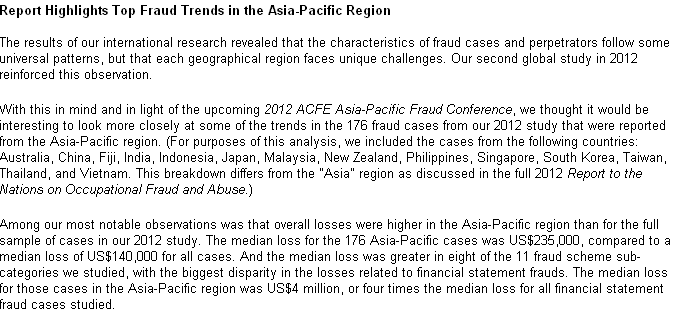
To read more
click here

To read more,
click here
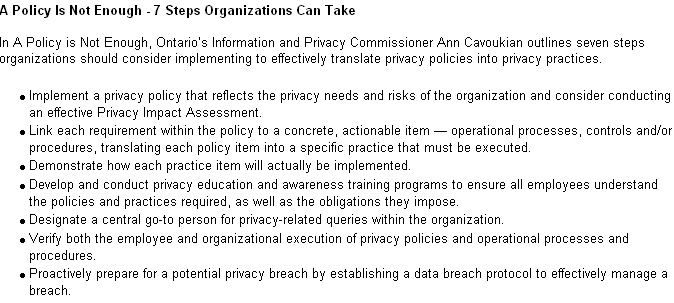
Source: Canadian
HR Reporter, Thomson Reuters Canada Limited. Excerpt of article
‘B.C. Ministry of Health fires 5 for privacy breach, http://www.hrreporter.com/articleview/16423-bc-ministry-of-health-fires-5-for-privacy-breach
EU's
Revamped Privacy Rules May Save Companies $3 Billion a Year
Companies could save as much as 2.3 billion euros ($3 billion)
in administrative costs thanks to an overhaul of the European
Union's data-protection rules. The proposed changes to the EU's
17-year-old data protection rules will allow companies to do business
in Europe based on just one law. Companies will save a further
130 million euros every year by not having to notify authorities
each and every time data is processed. Under
the European Commission's January proposal, companies face fines
as high as 2% of yearly global sales for mishandling or losing
personal data. The plans would also reduce the number of regulators
a company needs to contact for data-protection issues across the
region as the regulator of its home base will become a one-stop
shop. In practice, this will mean that Ireland's agency will be
in charge of regulating companies like Google Inc. (GOOG) and
Facebook Inc. (FB), which run their European operations from the
country. Ireland will take over the rotating
EU presidency for six months in January 2013.
To read more,
click here
Criminal
Past Checks to be Conducted on Taxi Drivers
Seoul City is planning to check every taxi driver to see whether
they have a criminal record by next year as part of measures to
protect passengers from crimes committed by cabbies. The plan,
however, may bring controversy over human rights infringements,
because drivers claim that the step treats all of them as potential
criminals. In the past, only
drivers with a newly obtained license were subject to having their
records checked. The revised law, which took effect on August
2, expands the monitoring to all drivers. Officials of the city
government said they are talking with police to see whether cabbies
in the capital were previously convicted of certain felonies in
order to cancel their licenses. The revised law also bans a former
convict from driving taxis for 20 years after their release from
prison ― a huge extension from the previous two years. But
police said the monitoring is only available for drivers who obtained
a license after the revised law's implementation. Taxi drivers
have protested the plan, which they claim infringes on their human
rights and is not a fundamental solution to prevent crime.
To read more, click
here
Privacy Commissioner Wants Power to Police 'Data Brokers'
New Zealand's privacy commissioner is seeking additional
powers to monitor companies that collect and sell personal data.
Assistant Privacy Commissioner Blair Stewart, said the current
version of the Privacy Act clears the way for enforcement only
after a complaint is filed, but many citizens do not know of the
existence of "data brokers". Data brokers collect publicly available
information and personal details gathered by other means, including
surveys doubling as prize giveaways. They may know details about
you or your household, including ethnicity, property value, what
foods you buy and how often you travel. The privacy commissioner
has supported a Law Commission recommendation to update the law,
giving the commissioner powers to serve compliance notices on
organizations. The Government is expected to respond to the Law
Commission's recommendations next month.
"People don't
tend to complain about certain practices, if the sort of practices
go on in the background and they can't see what's happening,"
said Stewart.
To read more, click
here
Data Protection: Employers can be Liable for their Contractors'
Mistakes
A recent fine imposed by the Information Commissioner
on Scottish Borders Council demonstrates that employers can be
liable for breach of data protection legislation by their contractors.
All employers handling data about employees must comply
with the Data Protection Act 1998 (the Act) and in particular,
the eight data protection principles set out in that legislation.
It is essential employers have streamlined and compliant arrangements
in place to try to avoid incurring substantial fines due to the
short comings of their outsourced service providers. As a minimum
there should be a written agreement between their data controller
and their data processor, which should contain warranties regarding
compliance with the data protection principles and an indemnity
for any breach of the Act to encourage best practice.
To read more, click here
Singapore Finally Passes Personal Data Protection Bill
The Singapore parliament finally passed the personal data protection
bill that is designed to safeguard an individual's personal data
against misuse. It encompasses a national Do-Not-Call registry
and a new enforcement agency will be tasked to regulate the management
of personal data by businesses and impose financial penalties.
Singapore's personal data protection law will give individuals
more control over their personal data, since they have to give
consent and be informed of the purposes for which organizations
collect, use, or disclose the information.
They can
seek compensation for damages directly suffered from a breach
of the data protection rules through private rights of action.
The Bill applies to all organizations across the private sector,
but does not cover the public sector, which already has its own
set of data protection rules with which all public officers must
comply. To give time for businesses to adjust,
the data protection law will be implemented in a phased approach
and will become official by January 2013.
To read more,
click
here

Breach Disclosure 'Inevitable' for Singapore Data Protection Law
Public disclosure and notification of companies' security breaches
will "inevitably" be part of discussions in future amendments
to Singapore's upcoming Data Protection Act, as the country looks
to keep in line with more mature jurisdictions. Notification
of security breaches by companies is already a part of several
jurisdictions such as with the European data protection and America's
data protection directive. Singapore is relatively
new with its data protection bill not officially enacted yet,
therefore it will look to countries with more mature laws for
adequacy, or giving its citizens similar level of data protection.
Currently, it is not mandatory for organizations to issue data
breach notifications. For example, if a Singapore company with
international operations is breached, they would have to disclose
the breach in countries such as the U.S. where the data protection
law states the company has to notify them. However, they do not
have to disclose it in Singapore. This could affect companies
and the way they do business because of differing regulations,
while citizens may question inconsistencies between the local
government and those abroad.
To read more, click
here
Taiwan's New Personal Data Protection Act Becomes Effective
on October 1, 2012
Taiwan's new Personal Data Protection Act ("PDPA") has gone into
effect as of October 1, 2012, while two controversial articles
remain pending. Under this new law, all government, non-government
sectors, and individuals will be subject to the PDPA. The definition
"Personal Data" is also expanded to a broad scope. The impacts
of new PDPA include: (1) all enterprises and individuals that
collect, process or use Personal Data are subject to the PDPA;
(2) statutory requirements and procedures must be followed when
collecting, processing or using Personal Data; (3) proper safety
measures must be taken when retaining Personal Data files; (4)
failure to comply with the PDPA will be subject to civil liabilities
(up to NT$200M), administrative penalties (up to NT$500,000),
and criminal liabilities (up to 5 years and/or NT$1M). All enterprises
and individuals are advised to take the necessary steps, including
amending contracts with related parties and setting up relevant
policies and rules in order to comply.
To read more, click here
Unemployment Falls as Employment Reaches Record High
The number of people out of work in the UK fell by 50,000 to 2.53
million in the three months leading to August as employment reached
a record high of almost 30 million, while the unemployment rate
fell to 7.9%. The number of people in employment has not been
higher since records began in 1971, while the total level of unemployment
is the lowest since spring 2011. Despite the tough economic times,
the private sector continues to create jobs and welfare reforms
are encouraging people to return to work - with 170,000 fewer
people on the main out-of-work benefits than in May 2010. Neil
Owen, global practice director at recruiter Robert Half International,
says: "While the long-term state of the economy is still unclear,
today's labor market figures are positive and may signal the UK
jobs market is finally turning a corner." The job numbers appear
to be driven by flexible working; increases in temporary and part-time
positions.
To read more, click here

The
Public Voice" in Uruguay: WP 29 Chair Says Proposed EU Regulation
is Not Tough Enough
Civil society organizations concerned with privacy and
data protection are meeting as "The Public Voice" in Uruguay,
in advance of the 34th Annual Meeting of Data Protection Authorities
and Privacy Commissioners. At the opening panel of The Public
Voice, Article 29 Working Party Chair Jacob Konstamm spoke in
favor of strengthening the pending EU Data Protection Regulation,
observing that he preferred the "leaked draft" that circulated
before the official draft was unveiled in January. Konstamm lamented
that government and business are not treated equally in one instrument
under the current proposals, with government subject to a proposed
non-self-executing Directive and business subject to the proposed
Regulation. Explaining that negotiations between the EU Parliament
and Council will begin in Spring 2013, Konstamm observed that
there currently is "fierce lobbying" going on in Brussels by the
U.S. government and the IT industry that "threatens to weaken"
the proposed Regulation. Konstamm focused in particular on three
issues he declared as critical in consideration of the EU Regulation:
explicit consent; the definition of personal data; and purpose
limitation.
To read more, click here (Subscriber-only
access; complimentary registration )

|
ADVERTISERS IN THIS EDITION |
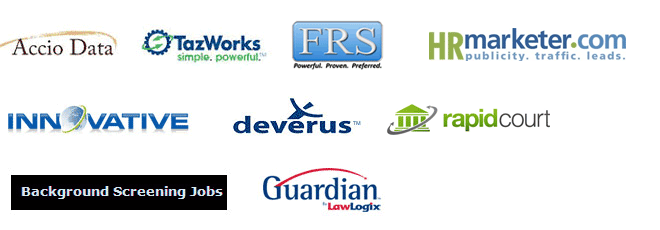

|  |
|
|
| |
|
Background
Screening Jobs |
|
Visit
the Job Board for the Employment and Tenant Screening Industry.
Here you will find resumes of people with industry experience
and employers seeking applicants with experience in Employment
and Tenant Screening and related businesses.
www.backgroundscreeningjobs.com

|
UPCOMING CONFERENCES, COURSES & EVENTS |
2012
Events (
Click Here to View full list of 2012 Events
) - Updated Monthly
SHRM
State Conferences, visit
http://www.shrm.org/Conferences/StateAffilliateConferences/Pages/default.aspx
Drug
and Alcohol Testing Industry Association (DATIA), 2012 Training
Course Schedule, visit
http://datia.org
SAPAA
Training Institute Learning Events, http://www.sapaa.com/
CUPA-HR
Conferences: http://www.cupahr.org/
World
Federation of People Management Associations, Events,
http://www.wfpma.com/events/by-region#quicktabs-tab-view__events__page_3-4
|
|
 Ublaahatkut
Ublaahatkut
